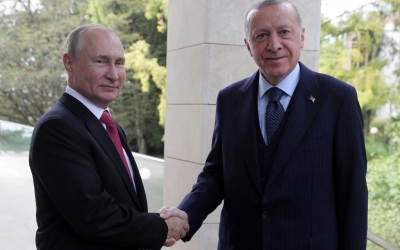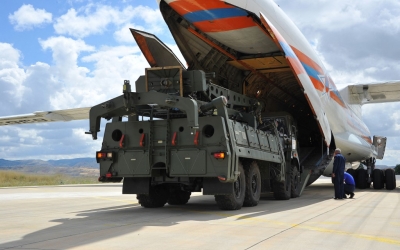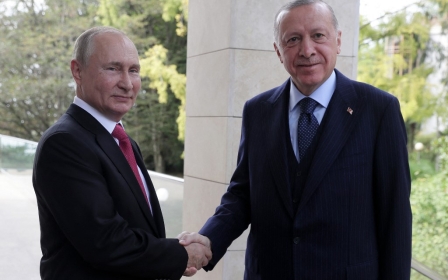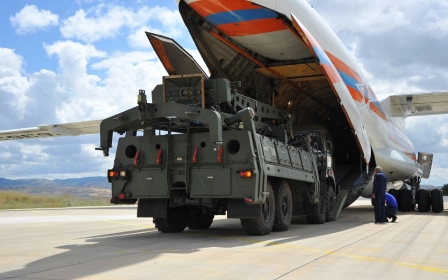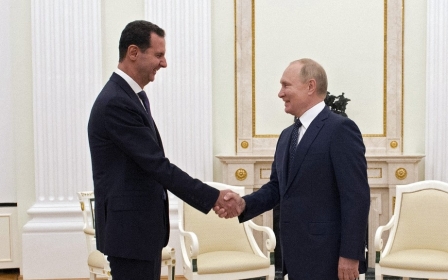Turkey to work with Russia on space, submarines and warships, says Erdogan
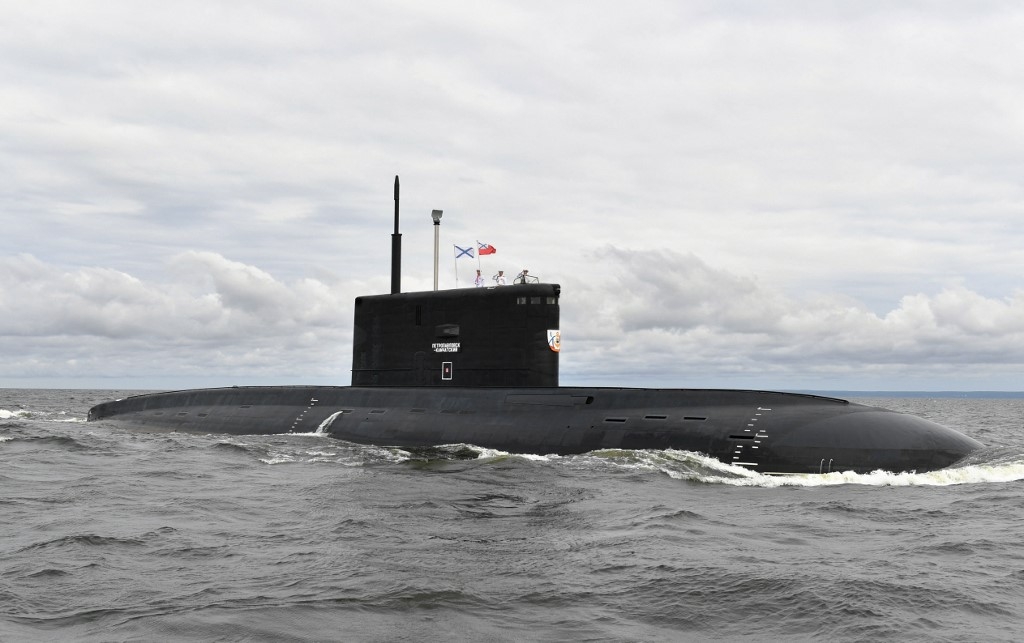
Turkish President Recep Tayyip Erdogan has said Ankara has decided to work with Russia to jointly produce jet engines, warships and submarines, during a meeting with his Russian counterpart Vladimir Putin.
Erdogan, in remarks to journalists who accompanied him to the Russian seaside town of Sochi on Wednesday, said that he mainly discussed defence and military issues with Putin.
New MEE newsletter: Jerusalem Dispatch
Sign up to get the latest insights and analysis on Israel-Palestine, alongside Turkey Unpacked and other MEE newsletters
“For example, we discussed steps to build a second and third nuclear reactor,” he said, referencing the Akkuyu nuclear reactor, which has already been built by Russia in southern Turkey.
Erdogan also reiterated that Turkey will not change its plans to purchase a second round of Russian S-400 missile defence systems, despite a threat of sanctions from the United States.
“We even comprehensively talked about the steps we can take on [building] jet engines,” Erdogan said.
“Another topic, we can take joint steps in the construction of [war]ships. We will, inshallah, even take joint steps on submarines.”
Erdogan also said he and Putin had talked about cooperating in the field of space exploration.
“Putin would like to work with Turkey in space. Our teams will study this issue and we will create a roadmap,” he said. “There is even a further offer; by creating one platform on the sea and another on land, we can jointly work on rocket firing tests to space.”
'There is no change in Idlib'
Erdogan’s meeting with Putin took place amid an uptick in attacks in Syria's Idlib, where Russian warplanes have targeted opposition strongholds close to Turkish military bases.
'There is no change in Idlib. We will preserve the status-quo there'
- Senior Turkish official
In March 2020, Turkey and Russia reached a ceasefire agreement that turned Idlib into a "de-escalation zone," but that deal has come under strain in recent weeks with air and ground bombardments of rebel-held positions.
More than three million Syrian refugees are trapped in Idlib and there are fears that further Syrian and Russian attacks could push them into Turkish territory, where public sentiment has hardened against them.
"There is no change in Idlib. We will preserve the status quo there," a senior Turkish official told Middle East Eye after the meeting on Wednesday.
Erdogan criticises Biden
Erdogan's remarks to journalists suggest Ankara tried to woo Moscow with promises of more defence cooperation to protect Idlib.
The president added that Turkey was still bound by the deals made with Russia on Syria and has no plans to withdraw from them.
“Of course some problems occur in the areas where we provide security in Idlib,” he said. “We reached a consensus to resolve these issues with phone diplomacy between the leaders, foreign ministers, defence ministers, and joint work by the respective intelligence agencies.”
US officials have repeated in the past both publicly and behind the close doors that any major arms purchase from Russia was sanctionable under US law.
Late last year, the US imposed sanctions on Turkey over its purchase of the Russian S-400 missile defence system and ejected Ankara from the Nato-led F-35 programme to develop advanced fighter jets.
Erdogan strongly criticised his US counterpart Joe Biden earlier this month after the White House snubbed Ankara’s request for a bilateral meeting on the sidelines of the UN General Assembly in New York.
On Wednesday, the Turkish president said he had received a response from Washington and that he will meet Biden in Rome on the sidelines of the G-20 summit in late October.
Middle East Eye delivers independent and unrivalled coverage and analysis of the Middle East, North Africa and beyond. To learn more about republishing this content and the associated fees, please fill out this form. More about MEE can be found here.


